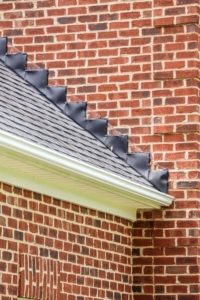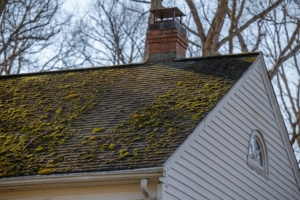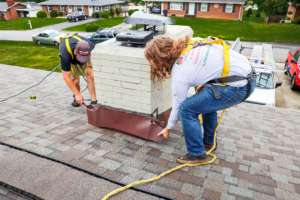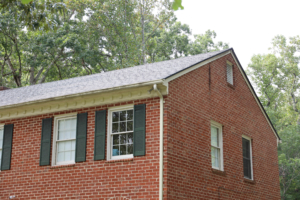Why Chimneys Leak And How They're Repaired

When you think of a chimney, you may think of cozy evenings by a fireplace or the smell of smoke on a crisp autumn evening, but in addition to being a seasonal comfort, chimneys also serve an important function in a roofing system. Just like with other aspects of a roof, chimneys need regular inspections to check for leaks.
Chimneys can leak for a variety of reasons, but there are several specific causes that our repair crews commonly find. When caught in the early stages, most repairs can be done in several hours. Taking time to learn about these causes will help you know how to take action in the early stages of damage and help you keep your roof in great condition for years to come.
- Damaged Flashing
- Missing Chimney Cap
- Damaged Chimney Crown
- Damaged Bricks/Mortar

Damaged Flashing
One of the most frequent causes of a leaky chimney is a crack in the caulk that seals the flashing (the sheet of metal installed around the surface where the chimney meets the roof). Flashing is what is placed around a chimney to prevent leaks. It ensures that the point of contact between the chimney and roof is completely sealed and watertight, which guards against leaks and water damage.
Weather can wreak havoc on caulk and flashing, and the resulting wear and tear can allow water to seep through. While most chimney flashing is now made from aluminum or copper, some homes may have older flashing made from steel which rusts more easily. If rust or water damage is visible, or you trace a leak back to the caulk or flashing, replace it as soon as possible in order to minimize any possible damage.
How to fix: Chimney flashing issues are hard to see from the ground, so have a professional check the flashing during a roof inspection. If the caulk or flashing is damaged or missing, the best solution is typically to replace the flashing with fresh caulking. This ensures that the intersection of the chimney and roof is sealed and able to withstand precipitation in the future.

Missing Chimney Cap
A missing or damaged chimney cap is another common source of leaks. The chimney cap helps block water from entering the opening at the top of your chimney. It also protects the opening from any wildlife or debris entering and building up inside the top of your chimney.
How to fix: The best way to repair a damaged chimney cap is to replace it. This relatively cheap, simple fix will protect your chimney and your home from further damage.

Damaged Chimney Crown
A chimney leak could be caused by a cracked chimney crown. This is the slab that covers the top of the chimney with the exception of a small hole in the middle for smoke to escape. It also provides a downward slope that guides water away from the top of the chimney, helping prevent brick and mortar erosion.
Over time, crowns can crack because of age and exposure to inclement weather. These cracks allow water to seep through into the house, and will further erode the crown.
How to fix: Chimney crown damage is difficult to identify because it is impossible to see from the ground, so a professional inspection is necessary. Once the damage is identified, the best solution is to have a professional rebuild the eroded parts of the chimney as soon as possible.

Damaged Bricks/Mortar
Cracked or damaged bricks and mortar can also lead to a leak. Water enters into the chimney through cracks in the bricks, causing a leak. In colder weather, the water expands which causes the cracks to widen and opens your chimney up to more leaks and further damage.
How to fix: The most susceptible areas of your chimney are places where the bricks and mortar join together. When a leak occurs, the best solution is to have the bricks repaired by a professional. Schedule the repair as soon as possible. The sooner these cracks and splits are repaired, the less extensive the repair work will need to be and the risk water damage to your chimney, roof, and home will be lessened.
Cenvar Roofing
If you are experiencing a leaky chimney, let us diagnose the source. We are committed to leaving each customer with a functioning chimney that meets our standard of excellence. If we aren’t able to complete the necessary work for your chimney, we will recommend a qualified stonemason who you can trust with the rest of your project. Schedule your free estimate today to get started.

